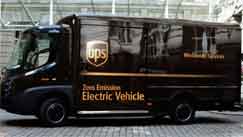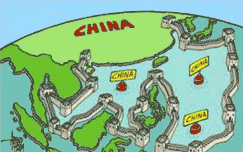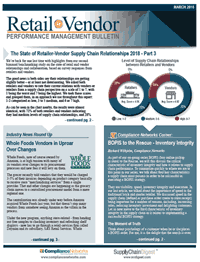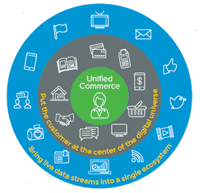One Column, Three Supply Chain Topics
As we roll out of a slow week into the Easter weekend, just some thoughts on three random topics that I think you may find of interest.
More on the End of Fossil Fuels
In late 2017, I wrote a column on the End of Fossil Fuels Era, which predicted the move to electric cars and trucks may come faster than most of us have thought, driven by the growing number of mandates by countries from China to India to the UK that would mandate electric vehicles generally by 2030 or 2040.
| GILMORE SAYS: |
Companies that are not actively monitoring this situation in the South China Sea and developing scenario plans are, in my opinion, making a big mistake.
WHAT DO YOU SAY?
Send us your
Feedback here
|
I now believe a substantial switch will come even faster than that. China, for example, built some 800,000 charging stations for electric cars just in 2017, with similar plans for 2018.
We received a number of feedback emails on that column, most saying that I was underestimating important forces, such as growing numbers moving into the middle class across the globe and thus consuming more energy, the huge advantages of oil as a fuel, and the fact the oil is used for a lot more that powering vehicles.
All true, but I believe there is simply a momentum for e-car and trucks, driven by sustainability, that will dramatically alter the landscape. Fossil fuels won't go away - but they will in fact begin to fade into the sunset sooner that I once thought.
Case in point: As we wrote about this week, UPS in the UK recently made a rather extraordinary announcement, saying it will soon operate only electric trucks in central London, the result of what it says is breakthrough technology for charging e-truck batteries.
Over the next few years, UPS will grow its central London electric truck fleet from 52 currently to above 170.
The move comes from a development that UPS says is a "radical" change in battery charging technology - not in the batteries themselves, but rather in charging large numbers of them at once somehow more efficiently.
That means that electric trucks will soon in total be less expensive than diesel powered delivery vans, UPS said. When that happens, the switch to electric for most local-delivery operations will be a no-brainer.
The development will herald "a new generation of sustainable urban delivery services both here in London and in other major cities around the world," a UPS manager said. |
 Even more boldly, UPS also said this technology development marked the "beginning of the end" of the reliance on internal combustion engines. Wow. Even more boldly, UPS also said this technology development marked the "beginning of the end" of the reliance on internal combustion engines. Wow.
UPS added that it is conceivable that all UPS' local collection and distribution vehicles worldwide could be electric in the near future.
Next, have you seen what Volkswagen is up to in this area? It recently announced plans to build electric vehicles in 16 production sites across the globe by 2022, and is committing a massive $25 billion investment in battery cell contracts with suppliers.
To be fair, VW is also spending a lot of R&D on fossil fuel vehicles, but the commitment to electric cars is huge.
I don't know if e-trucks from Tesla and others will really be able handle hauls much longer than local UPS deliveries (it will surely be achieved in phases, whatever Tesla says), and the limited range for cars also remains an issue, especially outside urban areas.
But to me, the UPS and VW moves, among others, is simply more evidence that the e-horse is out of the barn and it isn't going back. The impacts on society (e.g., just consider how your local repair shop will be affected) and supply chain will be huge and not yet well understood.
Campaign to Minimize Concern over Job Losses from Supply Chain Robots?
Is it my imagination, or is there some sort of a loosely coordinated campaign to allay fears about job losses from robots in the supply chain?
In just the past couple of weeks, we first got a story in the New York Times about a FedEx freight hub in North Carolina that is cautiously but steadily adding mobile robots - but finding the machines aren't really reducing total jobs.
The robots are replacing "tuggers" that are used in the facility to move non-conveyable products basically from receiving to staging, each of which requires a human driver.
This is a job that robotic automated guided vehicles - especially with advances in smarts and optical systems - can easily do, and FedEx is slowly replacing the 25 human drivers with the machines.
But not to worry, the Times article says. Jobs won't be lost because the hub has been adding more that 100 new jobs annually. Displaced tugger drives will simply move to different jobs.
FedEx is "finding the machines aren't really net job killers at all" the Times says. It also notes that Dave Clark, an Amazon operations executive, says even after Amazon has installed more than 100,000 Kiva robots at 26 distribution centers in the United States, Canada, Europe and Japan, it is hiring massive quantities of DC associates.
It's the same basic story for on-line retailer Boxed, where CNBC recently reported a story under the headline "Robots make life better for workers at Boxed's New Jersey warehouse - and no one has been laid off."
Hmm...eerily familiar to the FedEx story.
Upon review, it appears the Boxed technology is what most of us would consider fairly standard DC automation, not robots.
Life is better now, says one worker, noting that she used to walk many miles picking orders. Now, she says, "The tote comes to you and you put the product in the tote and the tote goes away and another tote shows up. It's much easier, more interesting, it's kind of fun because you get to wear a headset, and the day goes by very quickly."
Think we can all agree that's better than walking all day to get the job done.
But when the plan was announced, many workers were in fact naturally anxious about their jobs. But not now, as the company has met its commitment of no layoffs from the automation.
Well, you might ask, how then was there ROI from the investment? Because Boxed, like the FedEx hub, is seeing high levels of growth, which can now be handled with much fewer new workers. But what about at slower growth operations?
There are some other stories out there now along this same theme, DC automation/robots without cutting jobs. The common denominator: rapid growth. I am convinced that robots before long will significantly cut the need for DC workers. Since they are increasingly hard to find, that may not be such a bad thing, but let's not sugar coat the impact.
Continued Tensions in the South China Sea
I have written about this several times, without much feedback, but the tensions between China and its neighbors and the US over control of various parts of the Pacific, notably the South China Sea, continue to get worse, not better.
 Just this past week, according to CNN, "China's military has put on a show of force in the South China Sea, with drills at sea and in the air to reinforce its claims in the contested region." Just this past week, according to CNN, "China's military has put on a show of force in the South China Sea, with drills at sea and in the air to reinforce its claims in the contested region."
Those drills included some 40 war ships accompanied by an aircraft carrier, and then a group of Chinese H-6K bombers, Su-35 fighter jets and other aircraft also conducted a series of aerial maneuvers and strike tactics in the region.
CNN then quotes an expert on the region as saying the maneuvers were in part "to symbolize that China is ready to fight" over its (I will add) absurd claims to what are now international waters.
I see almost no chance of this ending well. At a high level, there are two possibilities: (1) the confrontations turn hot, as the US challenge of Chinese control of the area provokes Chinese military reaction; or (2) the US decides it's not worth it, largely gives up on the region and leaves it open to Chinese dominance, pulling back its military presence and probably abandoning treaties that for example commit the US defending Taiwan against China aggression.
Companies that are not actively monitoring this situation and developing scenario plans are, in my opinion, making a huge mistake.
On that cheerful, I will wrap it up for this week. Would love your thoughts on any of the above topics.
What are your thoughts on any of these three topics? Let us know your thought at the Feedback button below. |



![]()

![]()

![]()














